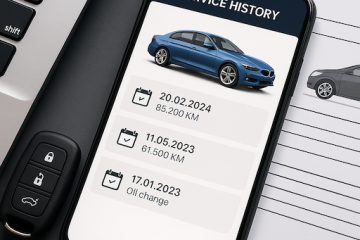Market Insight: Shifting Gears

From falling EV lease prices to a game-changing finance commission case, there’s plenty on the horizon that could redefine how we buy, sell and finance cars. In this month’s article, One Auto API Mark Fretwell gives his take on the major trends, the rising importance of data and why businesses that adapt quickly will thrive.
It’s hard to believe we’re already over a month into 2025.
As well as the weeks flying by, I’ve been reflecting on how rapidly the automotive market is evolving. From aggressive EV pricing strategies to rising costs and concerns over motor finance regulation, it can feel like a constant series of hurdles.
Yet in spite of all this, there’s a great deal of opportunity.
Profit margins might be tightening, but certain parts of the industry are becoming more accessible. For dealers, manufacturers and finance providers, it seems clear that success in this environment comes down to efficiency, adaptability and well-informed decision-making.
And, as consumer demand continues to shift in real time, businesses willing to embrace new ideas and data-driven insights are poised to get ahead.
EV Affordability: A Turning Point for Retail Adoption?
To date, high upfront costs have been one aspect that has held back widespread electric vehicle (EV) adoption.
Fleet sales have been driven by tax incentives and salary sacrifice schemes have played a supporting role too, but for the average retail buyer, EVs often came with premium price tags and heftier monthly payments — especially compared with traditional petrol or diesel models.
However, I’m seeing clear signs that 2025 could be a turning point for EV adoption, largely thanks to increased manufacturer support making lease deals far more competitive.
For instance, I recently received a promotional email from a leasing marketplace offering a new BMW i7 at just £496 per month (including VAT), with an initial rental of £5,952, on a 24-month, 12k mileage agreement.
I had to double-check the figures to make sure they were real — and they are.
It’s clear manufacturers are now investing heavily in deals like this. They need to sell increasing volumes to meet the Zero Emission Vehicle (ZEV) mandate and stand out in a market that’s quickly becoming crowded.
There’s also news that the UK government may provide loan guarantees to make EV finance more affordable, potentially narrowing the gap between EVs and their petrol or diesel equivalents.
Whether price parity arrives through manufacturer support or government backing, the result looks set to be the same: EVs are rapidly becoming more affordable.
For dealers, this means demand from retail buyers is likely to grow, shifting away from a fleet-dominated market. If you’ve been hesitant to stock used EVs, now may be the time to reconsider your strategy, ensuring you offer the right vehicles, competitive finance packages, and a clear plan to educate customers about electric driving.
A Buyer’s Market: New Car Prices Under Pressure
For the first time in a while, it seems the tables are turning in favour of consumers when it comes to new car prices. ZEV targets and greater competition from Chinese brands are combining to influence what manufacturers are able to charge.
Lower prices are clearly good news for consumers, but they present challenges for dealer and manufacturer profitability.
To navigate this climate and maintain margins, it will be important to keep operations lean, source stock strategically and concentrate on providing an exceptional customer experience.
Finance Commission Disclosure: A Dark Cloud Over Motor Finance
One of the biggest uncertainties in the UK automotive sector right now is a legal battle that could fundamentally reshape motor finance.
The Supreme Court is currently reviewing an appeal against the ruling that found it unlawful for lenders to pay commission to dealers without fully informed consumer consent.
The potential financial impact here is staggering — some analysts estimate compensation claims could reach £44 billion. Such a blow could reverberate across the entire motor finance sector and beyond.
Chancellor Rachel Reeves has intervened, warning that a draconian ruling could limit access to finance, push some lenders out of the UK market and negatively impact dealer profitability.
The Treasury has urged the Supreme Court to consider a proportionate approach, emphasising the importance of avoiding a decision that might reduce car finance options for consumers and destabilise the sector.
For now, dealers should be prepared for possible changes in finance structures, lender relationships and overall consumer affordability.
Whether this ends up being a short-term disruption or a major shift in how cars are financed and sold, time will tell.
Used Car Market: Strength in Resilience
Despite the regulatory and financial headwinds, the used car market remains fairly robust. Demand that built up towards the end of 2024 has carried into early 2025, with activity on the One Auto API platform suggesting a healthy start to the year.
That said, supply constraints persist.
The UK car parc has shrunk by 4.47% over the past three years, making it harder to source quality used cars. Internal combustion engine (ICE) vehicles remain in strong demand, but they’re becoming trickier to find.
Meanwhile, used EVs are steadily gaining market share, creating fresh opportunities for dealers who can address concerns about battery life and EV running costs.
Ultimately, a balanced approach remains key.
ICE vehicles are still sought after, but dealers who neglect the rising tide of used EV demand could find themselves missing out on a growing segment.
Data Drives Innovation
In a market undergoing so many shifts, data has become the most valuable tool for dealers, finance providers and digital platforms.
EV price reductions, evolving consumer preferences, and motor finance questions all point to the importance of making informed, data-led decisions.
In recent months we have seen a sharp increase in digital startups building apps that offer consumers everything from the ability to manage their service and maintenance to buying, selling and finance applications before they set foot in a dealership.
Projects like these require access to a wide range of resources, and One Auto API simplifies the process of accessing and integrating data – using features such as our Common Automotive Data Dictionary to reduce development costs and improve speed-to-market with new products and features.
The motor industry has always attracted entrepreneurs who see potential in tackling its challenges and it’s a real privilege to be involved in so many new initiatives.
A Final Word
The automotive sector is clearly shifting gears — and fast.
From the changing economics of EVs to potential upheavals in finance regulations, there’s no shortage of challenges and opportunities.
The key takeaways? Stay agile, invest in data-driven insights and never underestimate the value of strategic partnerships.
At One Auto API, we’re committed to helping our partners turn these market shifts into tangible growth. Whether you’re navigating new EV pricing strategies or looking to innovate with new products and features, our team is ready to support you every step of the way.
It’s an exciting time to be in automotive — and those who embrace the change will be the ones driving the industry forward.
Here to Help
Whether you need data-driven insights or ways to refine your processes, our tools and expertise can empower you to succeed in 2025 and beyond. If you are curious about how data can help you adapt to this shifting landscape — book a free 30-minute consultation to see how we can work together to keep your business ahead of the curve.


